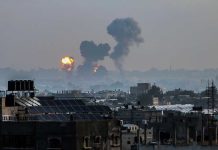
Rising tensions between Israel and Hezbollah have prompted the U.S. to swiftly evacuate over 1,100 citizens from Lebanon.
At a Glance
- Over 1,110 Americans evacuated as violence escalates between Israel and Hezbollah.
- State Department arranges flights to facilitate U.S. citizens’ departure from Lebanon.
- Intense Israeli airstrikes displace hundreds of thousands in Lebanon.
- The Lebanese humanitarian situation worsens amid geopolitical instability.
Escalating Conflict in Lebanon
Over 1,110 Americans have left Lebanon as conflicts between Israel and Hezbollah intensify. The U.S. State Department facilitated these evacuations due to increasing threats to American lives. Thousands have fled southern Lebanon under Israeli bombardments. With Lebanon struggling with government paralysis and economic turmoil, the evacuees faced dire conditions, leading the U.S. to expedite their extraction from the conflict zone.
Flights are ongoing, with many evacuees being transported to Istanbul. Additional flights are anticipated as the U.S. government monitors the evolving landscape to ensure citizen safety. Meanwhile, the U.N. has urged a cease-fire, and international aid is being channeled to stymie the displacement crisis in Lebanon.
The US is sending a small number of additional forces to the Middle East as violence between Israel and Hezbollah in Lebanon rises, the State Department warns Americans to evacuate and concerns grow of a regional war. w/ @lbaldor https://t.co/cG8ANr8N1i
— Tara Copp (@TaraCopp) September 23, 2024
Intense Airstrikes and Mass Displacement
In recent weeks, Israel conducted over 1,100 airstrikes in Lebanon, impacting more than 600,000 people who have been displaced internally, with over 300,000 leaving the country. Over 800 of Lebanon’s 990 shelters are already occupied, providing inadequate facilities to those affected. Meanwhile, a quarter of Lebanese territories are under evacuation orders, anticipating escalations in military actions.
“Unrelenting bombardment is now part and parcel of daily life in Lebanon, with the latest blasts not even half an hour ago,” she said. “Far too many people are paying an unimaginable price, with over 2,000 killed, many more wounded and hundreds of thousands displaced.”
The humanitarian impact is alarming, with Lebanon’s resources strained. Half of the public schools are now being used as shelters, delaying education for a significant number of students. In response to the severity of the situation, the European Union, France, and Qatar, among others, are contributing humanitarian aid.
US prepares to evacuate Americans from Lebanon amid Israel-Hezbollah tensionshttps://t.co/0WLG3H8s7Y
— Middle East Monitor (@MiddleEastMnt) June 28, 2024
Tensions Heightened with Hezbollah’s Retaliation
Hezbollah has responded with numerous missile strikes into northern Israel, although many have been intercepted or landed harmlessly. Still, these hostilities present a serious threat to regional stability, reminiscent of the 2006 war. The situation compounds fears of a broader conflict, especially as Hezbollah backs Hamas in ongoing conflicts against Israel.
Both Israel and Hezbollah’s ongoing strikes continue irrespective of calls for peace. The evacuation of U.S. citizens underscores the international concern and the urgency required to address the conflict. Observers fear that continued hostilities could lead to severe consequences for the region, invoking memories of Israel’s past interventions in Lebanon.
Sources
1. Over 900,000 in Lebanon Displaced, U.N. Says, as Israel Attacks Hezbollah









